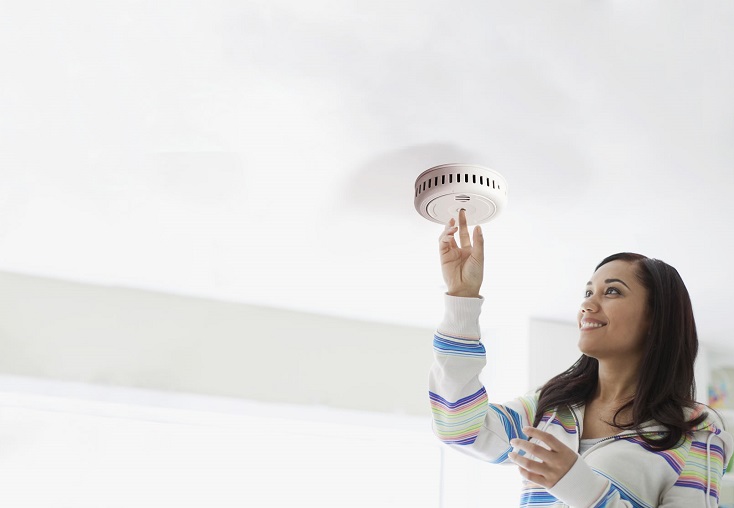Smoke alarm purchasing is the National Fire Chief Council’s ‘Theme of the Month’ for August, so there is no better time to check yours are up to date and in perfect working order.
We are therefore reminding people to make sure they fit smoke alarms on every level of their home and to test them regularly.
It only takes a few seconds and saves lives.
This is especially important in view of the current high temperatures, the large number of fires in our area during the heatwave and the risks to people’s homes.
Fire statistics reveal that one smoke alarm may not be enough to provide you with the best chance of escaping a fire in the home, while research shows that only 26 per cent of all households who own an alarm test them on a regular basis.
It’s clear that most people know a working smoke alarm can save lives by providing those vital few seconds needed to escape a fire in the home.
But, despite the majority of homes nationally (over 90 per cent) having at least one working smoke alarm, smoke alarms only alerted householders to well under half of all fires in the home in England.
Smoke alarms failed to activate most commonly because the fires were outside their range.
During the last ten years (1 April 2012 – 31 March 2022), HWFRS attended some 1,494 incidents where no smoke alarm was fitted and 4,314 where one was fitted.
Where they were fitted, 488 were not close enough to the fire to be effective, 70 had an alarm battery missing, in 32 the detector was removed and in 32 the battery was defective.
In 187 incidents, the fire was in an area not covered by the smoke alarm system and in over 200 fire incidents the smoke detector was determined to be not suitably positioned.
The Government announced last year that housing providers will be legally required to install smoke alarms in all social housing, while carbon monoxide alarms must be fitted in social and private rented properties with fixed appliances such as gas boilers or fires (find out more at All social homes required to have smoke alarms fitted – GOV.UK (www.gov.uk).
For these reasons, the Fire Kills campaign and HWFRS are encouraging people in the two counties to catch up on smoke alarms in their home.
Watch Commander James Gough, of the HWFRS Prevention department, said:
“We must all make sure that we have enough smoke alarms to cover the whole of our homes. If you don’t have enough, or they’re not in the right place, you might not be alerted in time.
“The vast majority of us now have at least one smoke alarm in our homes, but early detection and warning is vital to reduce the devastation a fire in the home can cause.
“This is particularly important in view of the excessive temperatures we’ve been experiencing lately.”
James added:
“Please ensure you have at least one smoke alarm on every level of your home, preferably in hallways and landings. And placing smoke alarms near sleeping areas and in rooms where there are electrical appliances could give you the extra warning you need.
“Don’t forget that smoke alarms don’t last forever. The power might work, but the detection mechanism deteriorates with time. So, whether they’re battery operated or wired to the mains, to work at their best they should be replaced every ten years.”
The Service is asking people to take on board these smoke alarm top tips:
- install at least one smoke alarm on every level of your home
- fit your smoke alarms in the right place. The ideal position is on the ceiling, in the middle of a room or on a hallway or landing
- consider fitting additional alarms in other rooms where there are electrical appliances and near sleeping areas
- don’t put smoke alarms in or near kitchens and bathrooms where smoke or steam can set them off by accident
- test each of your alarms by pushing the button every week – why not ‘Test it on a Tuesday’?
- if you wear a hearing aid, can you hear the alarms when you are not wearing the hearing aid, e.g. at night?
- replace your smoke alarms every ten years
HWFRS is also urging carers and people who keep a close eye on less able relatives to check that these homes have enough smoke alarms and that they are in the right places too. Please don’t ignore a neighbour’s bleeping smoke alarm – it could well be a real fire and they might not have heard it.
For more information, see https://firekills.campaign.gov.uk/.
You can find out more about fire safety at .hwfire.org.uk/safety-and-advice/, and you can also contact our Prevention Team on 0800 032 1155 to see if they might qualify for a free Home Fire Safety visit.
You can also complete a FREE online Home Fire Safety Check now by following the link
on our website.
This easy-to-follow home fire safety check will take you through your home one room at a time and the simple questions will help you spot fire risks as you go around your home.
Further safety advice can be found at www.hwfire.org.uk.
